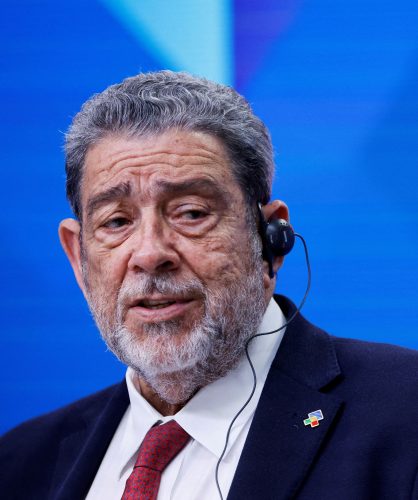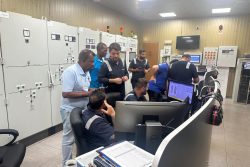Following weeks of rising tension over their border controversy, Guyana and Venezuela are set for talks today in St Vincent and the Grenadines aimed at calming aggressive actions by Caracas to push its claim on this country’s Essequibo region despite an order by the World Court to desist.
Confirming that both President Irfaan Ali and President Nicolás Maduro are to attend the planned meeting facilitated by him this morning at the Argyle International Airport, Prime Minister of St. Vincent and the Grenadines, Ralph Gonsalves, yesterday said he also understands the parameters of the talks and those will be respected.
Relations between the two countries have been brought to the brink by Venezuela’s decision to declare Essequibo a new state following a referendum on December 3rd along with a range of measures including the naming of a military commander for the area and warning by Caracas to investors here.

On December 1st, the International Court of Justice (ICJ) ruled that Venezuela should take no steps to interfere with Guyana’s control of Essequibo pending the determination of the substantive case where Georgetown is seeking the upholding of the validity of the 1899 arbitral award setting the boundary between the two countries. The court also warned against aggravating matters surrounding the case but this did not prevent Caracas from creating a state out of Essequibo.
In the last six weeks there have been troop movements on the Venezuelan side along with belligerent statements from Maduro and other senior government officials. As a result, Guyana has launched a campaign here and overseas to draw attention to Venezuela’s aggression and has received support from countries and groups like the Commonwealth and the Organisation of American States.
At the meeting, scheduled to begin at 10 am, where Gonsalves said that a number of regional leaders and representatives will be present, he posited that it was good that the two Presidents could talk to each other.
“I have spoken to the leaders on their respective positions. I have been advised by other people on it – professionals, and I’ve read the documentation myself. So, I have a fair idea of limitations and possibilities. But at the end of the day, we’re talking. It’s better to be talking than quarrelling or fighting; even if you state your positions, with some firmness – the respective parties – and do so respectfully,” Gonsalves yesterday told a press conference he hosted in Kingstown.
The Government here and Gonsalves have remained tightlipped about the agenda for the meeting. “You have to understand and appreciate the sensitivity of these talks, so one thing misconstrued could have consequences and impact the entire meeting… please understand,” a senior government official told Stabroek News.
Gonsalves announced that several Prime Ministers of CARICOM were attending. “Prime Ministers (Roosevelt) Skerrit, Chairman of CARICOM, Prime Minister of Dominica. I expect Prime Ministers, (Dickon) Mitchell of Grenada and Phillip Pierre of St. Lucia, Prime Minister of The Bahamas (Philip Davis) and Prime Minister Mia Mottley of Barbados is coming in tomorrow [today]… and Prime Minister (Keith) Rowley from Trinidad and Tobago is coming in in the morning,” Gonsalves said.
Presidents Ali and Maduro will both leave this morning for the meeting.
President Ali’s delegation still has not been made public with sources from government saying that it was due primarily to security concerns.
Last evening, according to Gonsalves, the personal envoy of Brazilian President, Luis Inacio ‘Lula’ Da Silva was due to arrive. Brazil media reported that Lula will send that country’s former Foreign Minister and current Presidential Advisor on International Affairs, Celso Amorim.
Amorim had visited Venezuela last month and had raised the Guyana issue, according to the Brazilian President.
Gonsalves noted that Amorim “was 10 years a foreign minister in Brazil and five years Minister of Defence and he had been doing work for President Lula with President Maduro and President Ali.”
Separately, two diplomats from the United Nations Secretary General’s office, including Courtenay Rattray, a Jamaican diplomat who is the United Nations High Representative for the Least Developed Countries, Landlocked Developing Countries and Small Island Developing States, and current Chef de Cabinet to the United Nations Secretary-General, also arrived in Kingstown last evening.
On Tuesday, an advance party of Venezuelans arrived in the country to take care of security and other arrangements along with media personnel from Caracas.
An advance team including media personnel from Guyana also left for St. Vincent yesterday and this morning another group will arrive.
Gonsalves said that a lot of detailed work had to be done “diplomatically and organisationally.”
Not a mediator
He made it clear that he was not a mediator of the talks as “St Vincent and Grenadines is facilitating and we are doing work in addition to a facilitator, doing preparatory work as an interlocutor; not a mediator.”
The seriousness of distinguishing his position, according to Gonsalves, was pertinent to the talks, because he knows how important it was in getting the two sides to meet.
He said that last Monday, there was to be a resolution at the Organization of American States on the Guyana and Venezuela matter but he asked that it be set aside until the two had met.
“I saw the draft resolution. And I ask the persons who are involved; the relevant persons, couldn’t we postpone it? Because you could bet your life if that resolution, had come about on Monday, there are a lot of things which would have been said on the floor of the chamber, the General Assembly at the OAS, you could’ve bet your life that the Venezuelan government would have reacted on Monday, on Tuesday, on Wednesday. But the leaders are talking tomorrow. Why would you want to do something which may not aid a settlement, aid a resolution, reduce the possibilities of threats or the use of force?” he expressed.
“And I think since we have announced these talks, and we asked for a lessening of the harsh rhetoric, I think people would have observed that the extent of the rhetoric coming out from both capitals, Georgetown and Caracas that the extent of the rhetoric has been reduced. There is de-escalation even though that both presidents Ali and Maduro wrote me letters and made those letters public as is perfectly in order, so that their respective populations and I will know, what is their position,” he said.






